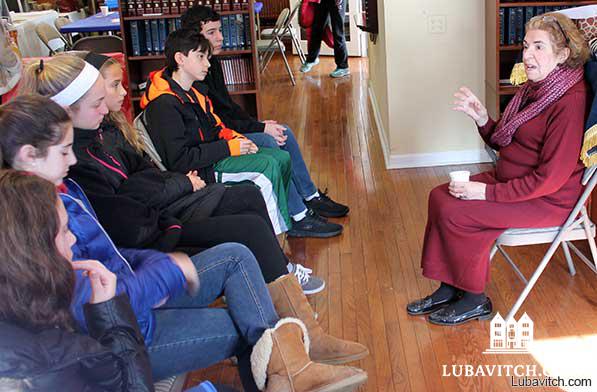Once they approach Bat and Bar Mitzvah milestone, tweens typically drop out of Hebrew School. This fact is supported by the findings of a 2008 study commissioned by the Avi Chai Foundation: “enrollment drops precipitously… more students are enrolled in the lower grades than the higher ones.”
Chabad of Hunterdon County, New Jersey, set out to change that and keep them coming to their Sunday lessons, even as they focus much of their attention on lessons to prepare for their big day.
“They have already learned their Hebrew alphabet and about the Jewish holidays. We wanted to create a program that would continue to engage them in their Judaism, in a relevant and rewarding way,” says Rabbi Eli Kornfeld, who directs the Jewish center together with his wife Rachel.
 Rachel Kornfeld, director of the Hebrew School program, and her assistant director Chana Greene, developed a series of lessons to achieve that. One, for example, took place at a local coffee shop, focusing on various mitzvahs followed by its application to real life.
Rachel Kornfeld, director of the Hebrew School program, and her assistant director Chana Greene, developed a series of lessons to achieve that. One, for example, took place at a local coffee shop, focusing on various mitzvahs followed by its application to real life.
Last month they studied about the agricultural laws of Shemittah, the seventh year when Jews in Israel refrain from doing any agriculture work and owners must abandon the fields crop to the public. The takeaway: students reflected on the abundance of produce, whether fruits, vegetables or grains, as a gift from G-d to be shared with others.
This was followed in practice, when the group launched a fundraising project for Grow-a-Row America, a local organization dedicated to stopping hunger in America.
Students labeled their change collection “Pennies 4 Produce” and held a bake sale to raise funds. Sally Zeiner from Grow-A-Row shared the importance of their efforts at an interactive event demonstrating how hunger and food malnutrition affects locals. Zeiner also explained how much it costs to feed each family for a day.
“We wanted them to understand how their jar-filled coins, collected one by one, will actually feed this amount of meals to these amount of families,” Eli Kornfeld says. “It is a learning lesson that no mitzvah is too small, and that when added up, makes a real difference.”
The tweens and teens response to these programs, say its leaders, is easily measured by their attendance. “In past years, engaging them and keeping them coming was difficult; this year we have 99% attendance,” says Greene. “They now look forward to every week.”

Rachel Lubin switched her daughter Alex to the Chabad Hebrew School three years ago. She has found them “much more welcoming, and the approach is different” with a creative programs to engage the children and tweens.
Now she says, her daughter, who will soon have her Bat Mitzvah, expects to continue with the program. “They are very good striking a balance between the lesson and volunteer work.” The program, she says, is effective at teaching Alex how to exercise good membership within the society, and “how to give back to the community.”

Be the first to write a comment.